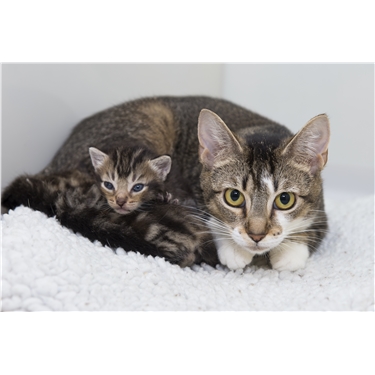Neutering- Family Planning for Felines
21 August 2019

Neutering- family planning for felines
Cats Protection believes that getting your cat neutered before it can breed is an essential part of responsible cat ownership. Cats are very effective breeders and the number of kittens they produce increases in line with the amount of food and shelter available.
Without neutering, the UK’s cat population can quickly get out of control. Overpopulation increases feline infectious disease, stress-related disease, feline conflict and compromises cats’ welfare.
What is neutering?
Neutering is a surgical operation which stops female cats from becoming pregnant and male cats from making females pregnant.
A female cat is spayed- her ovaries and uterus (womb) are removed.
A male cat is castrated- his testicles are removed.
Cats Protection generally recommends that kittens are neutered at around 4 months of age or younger- although your cat can be neutered at any age.
Neutering is the best way to deal with the problems of unwanted pregnancies, by preventing the problem in the first place. Neutering also prevents some cancers and infections, reduces straying, fighting and spraying.
When to neuter?
Traditionally, cats were neutered from 6 months of age. However, current scientific research indicates that there are no disadvantages in neutering at a younger age- for example, from 8 weeks onwards. As kittens can reach sexual maturity and breed from 4 months, Cats Protection generally recommends that kittens are neutered at around 4 months of age, or younger.
Why neuter?
Neutering has many health benefits, as well as helping to reduce the number of unwanted cats in the UK.
Unneutered male cats:
-
Are more likely to end up injured or catch diseases from fighting, with subsequent suffering and vet bills
-
Routinely travel a large territory of many miles in search of unneutered females, risking road accidents and injury
-
Will spray strong smelling urine to mark territory and attract females
-
Are at risk of tumours of the testicles
-
Are not better hunters than neutered cats, as hunting is not a sexual behaviour
-
May experience a high level of stress due to the frustration of not being able to find a mate.
Conversely, neutered male cats:
-
Are less likely to roam, reducing the risk of them suffering from car accidents
-
Are less likely to fight which reduces the risk of them getting injured or contracting serious diseases such as Feline Immunodeficiency Virus (FIV) or Feline Leukaemia Virus (FeLV)
-
Are less likely to spray
-
Are unable to develop tumours of the testicles
Unneutered female cats
-
Frequently become pregnant from 4 months of age
-
Will often have litters of kittens 3 times a year. This adds to the overpopulation problem and increases costs for the owner, especially if there are complications during pregnancy or birth
-
Will call and wail every 3 weeks during the breeding season- January to August- to attract a male, until they become pregnant
-
Are more likely to contract diseases spread through sexual contact and mating behaviour
-
Are at risk of cancer of the ovaries, uterus and mammary glands, as well as developing pyometra- a serious infection of the womb.
Conversely, neutered female cats:
-
Won’t become pregnant, so there will be no expense associated with litters of kittens
-
Do not call or wail, so less disturbed sleep for the owner and neighbours
-
Are less likely to contract diseases such as FIV and FeLV spread by bites and mating behaviour
-
Are unable to develop cancer of the ovaries or uterus. They are also at greatly reduced risk of developing mammary cancer- especially if neutered early.
The kittens born following an unplanned pregnancy:
-
May be at risk of disease
-
Cost a lot to look after and be provided with veterinary care
-
May find themselves homeless
-
May deprive another unwanted cat or kitten from finding a new home as there are not enough homes to go round
Cats are very resilient, and usually recover very quickly from the operation. Kittens seem to recover even more quickly than adult cats. Your cat will require much less food after neutering as their body will have less work to do, so you will need to monitor your cat’s weight and reduce the amount of food provided to prevent your cat from becoming overweight. This will save you money throughout its life!
Facts to dispel the neutering myths
-
Cats will readily breed with their siblings and parents
-
Cats can start breeding from just 4 months of age
-
Kittens can be safely neutered before 6 months of age
-
It is not beneficial for a cat to have a season or a litter before being spayed
-
The length of pregnancy in cats is just 9 weeks and female cats can come into season again as early as 1 or 2 weeks after giving birth
-
A cat can quite easily have up to 3 litters a year with 5 or 6 kittens in each litter. That adds up to 18 caring homes for Cats Protection to find each year, just for one cat’s kittens! This level of breeding is very draining and can be harmful for the mother cat
-
Neutering when a female is in season or pregnant can be performed and is best discussed with your vet.